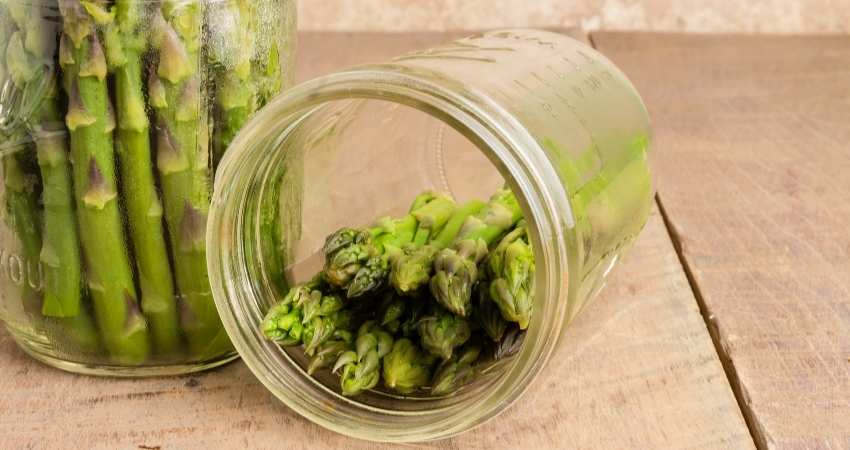A Guide To Storing Asparagus The Proper Way
Asparagus is not only fast to prepare, it also turns bad fast if not stored properly. Therefore, how do you store asparagus?
Asparagus should be stored in the refrigerator. The asparagus should be standing upright in a jar with its cut lower spears soaking in water. Follow these four steps:
- Cut 1 inch off the bottom of the spear.
- Set the spears upright in a glass jar.
- Fill the bottom with water just enough to cover the cut ends.
- Loosely cover, refrigerate and replace the water daily.
In this guide, we’ll explain the best way to store asparagus for maximum shelf life as well as nutrient retention. I’ll take you for a walk through the best-storing techniques, tips, and methods.

Disclaimer: Some of links in this article are affiliate links which means I may earn a small commission at no extra cost to you. As an Amazon associate I earn from qualifying purchases.
As a Certified Health Coach many clients ask me about food storage including asparagus. Also, I purchase and consume it almost every week. Therefore, I have researched this topic in the past and present. Let’s examine the storage methods closely.
Refrigeration and Fresh Asparagus
Although asparagus has been popular, it hasn’t drawn much attention on how to store it properly. Many people, and even supermarkets, do not adequately keep their asparagus using the ideal method: refrigeration.
Refrigerating fresh asparagus is the ideal method of storage. Storing asparagus at room temperature is not adequate. Asparagus kept at room temperature will lose as much as 50% of its vitamin C in as little as 48 hours.
Storing asparagus in the refrigerator is essential to maximizing the length of time with which the asparagus is still good to eat. Cooler temperatures like those found in the fridge slow the asparagus plants’ breakdown process after harvest.
Knowing the refrigerator is the best place to store asparagus, let’s look at the techniques used to make this storage place a success.
How To Store Asparagus Properly In The Refrigerator
When you first bring asparagus home from the grocery store, you’ll likely notice it sells with the spears pointing upward in most stores. Typically, they’re bundled together with a rubber band. They are usually standing upright in a small amount of water, often including ice cubes.
Any Supermarket that doesn’t display their asparagus standing upright in a small amount of water, including ice, is not storing the asparagus properly. You may want to avoid purchasing it from these stores.
Asparagus stored in colder conditions will retain more nutrients. Therefore, a supermarket selling asparagus stored at room temperature sells you a lower quality product depending on how long they have kept it in these conditions.

4 steps for proper storage of asparagus in the refrigerator.
Step 1.
Cut approximately 1 inch off the bottom of the spears. You can cut as little as half an inch. However, it’s usually about an inch that needs removal. Removal of any of the bottom of the stock that has dried out is essential.
Step 2.
After cutting off the dried ends of the stocks, immediately set them upright in a glass jar. A glass jar is best to use because of its weight. It will hold the spears in an upright position with no effort.
Step 3.
Add approximately 1 to 2 inches of water into the glass jar fully submerging the new cut ends. Do not add too much water as it will ruin the spears. Only pour in about an inch or so, just enough to cover all of the cut ends. Loosely cover the asparagus.
Step 4.
Change the water in the jar daily replacing the water with fresh cold water from the tap. Again, fill the water to only about an inch to 2 inches in the jar, just enough to cover the cut ends.
Using this technique, you can properly maintain asparagus in the fridge1, the preferred place to store this fantastic vegetable.
Did you know even the ancient Romans and Egyptians ate asparagus? Both cultures ate the asparagus freshly picked and dried it out, so they could eat it later in the colder months.
Asparagus Shelf Life In The Fridge
Now that you know how to store asparagus properly with the steps listed above, it’s good to know the timeline for how long the shelf life is.
Storing asparagus in the refrigerator will maintain the asparagus in an edible condition for up to 1 to 1.5 weeks.
It’s important to know that changing the water in the jar is not quite enough for long-term storage. The asparagus will need having the ends recut after about four to five days of sitting in the water.
Cutting the ends off of the asparagus where it starts to get mushy is essential to the asparagus’ extended storage. However, the maximum length of time storing the asparagus in the water will only be about a week to a week and a half.
After this, the vegetable will begin to turn mushy and will no longer be edible. Is there a way to store it even longer? Let’s find out.

Asparagus: Long-Term Storage
As mentioned earlier, the ancient Egyptians, Greeks, and Romans all ate asparagus. Asparagus has been dated as far back as 3000 BC by the Egyptians2. So how did the Egyptians, Greeks, and Romans keep asparagus without having electricity for refrigeration?
Many cultures have found success with dehydration to store asparagus long-term. This method has seen centuries of success. Dehydration was also used by the ancient Greeks and Romans to store asparagus for many months.
Not everyone has a dehydrator to dehydrate fruits, vegetables, and other things for long-term storage. Therefore, we need to look at other possible solutions for the long-term storage of asparagus. If we can’t dehydrate asparagus, then surely we must be able to freeze it for the long term.
Check out affordable dehydrators on Amazon, food dehydrators.
Freezing Raw Asparagus
We’ve discussed the primary method of short-term storage for asparagus with the steps listed above to keep the vegetable in the refrigerator. We’ve also briefly discussed dehydration of asparagus and how ancient cultures used this method to store asparagus long-term.
Therefore, you may be thinking, can I freeze raw asparagus?
Asparagus can be frozen for the long-term. The following 5 steps are recommended for the procedure to freeze asparagus long-term.
Freezing Asparagus In 5 Steps
Step 1.
Cut the dried ends of the asparagus spears off like you would if you would store the asparagus in the refrigerator.
Step 2.
Wash the asparagus.
Step 3.
Blanch the asparagus by steaming in a pot for approximately two minutes for small spears, three minutes for medium and 4 minutes for large3.
Step 4.
Using a freezer bag, take the cut asparagus spears and lay them inside the bag in a single row. Using this method allows you to make a single layer of asparagus spears in the bag. A single layer allows you to remove more of the air inside the freezer bag. A larger bundle in the bag traps more air that cannot be squeezed out.
Step 5.
Remove as much air as possible from the freezer bag. You can use a straw to insert into the last open part of the bag and suck out as much air as you can. Another excellent method for doing this is by using a vacuum sealer system. Vacuum sealing your asparagus is the ideal method for long-term freezer success.
A vacuum sealer is one of those items that make you wonder how you did without one after using it for the first time. They sell a nice variety of them on Amazon which you can check out by clicking here, vacuum sealers.
When storing your asparagus using this method in the freezer, asparagus can last for up to a year and still be viable4.
If you have any questions to ask me about this article don’t hesitate to comment below or email us. You can find an email on our contact page.
Read Next – More Food Storage
Food Storage Bags Vs. Freezer Bags – What You Need To Know
This Is How To Store Strawberries For Best Results
Should You Refrigerate Balsamic Vinegar?
- Michigan Asparagus: Frequently Asked Questions [↩]
- Wikipedia: Asparagus [↩]
- National Center for Home Food Preservation: Freezing Asparagus [↩]
- North Dakota State University: Food Freezing Guide [↩]
